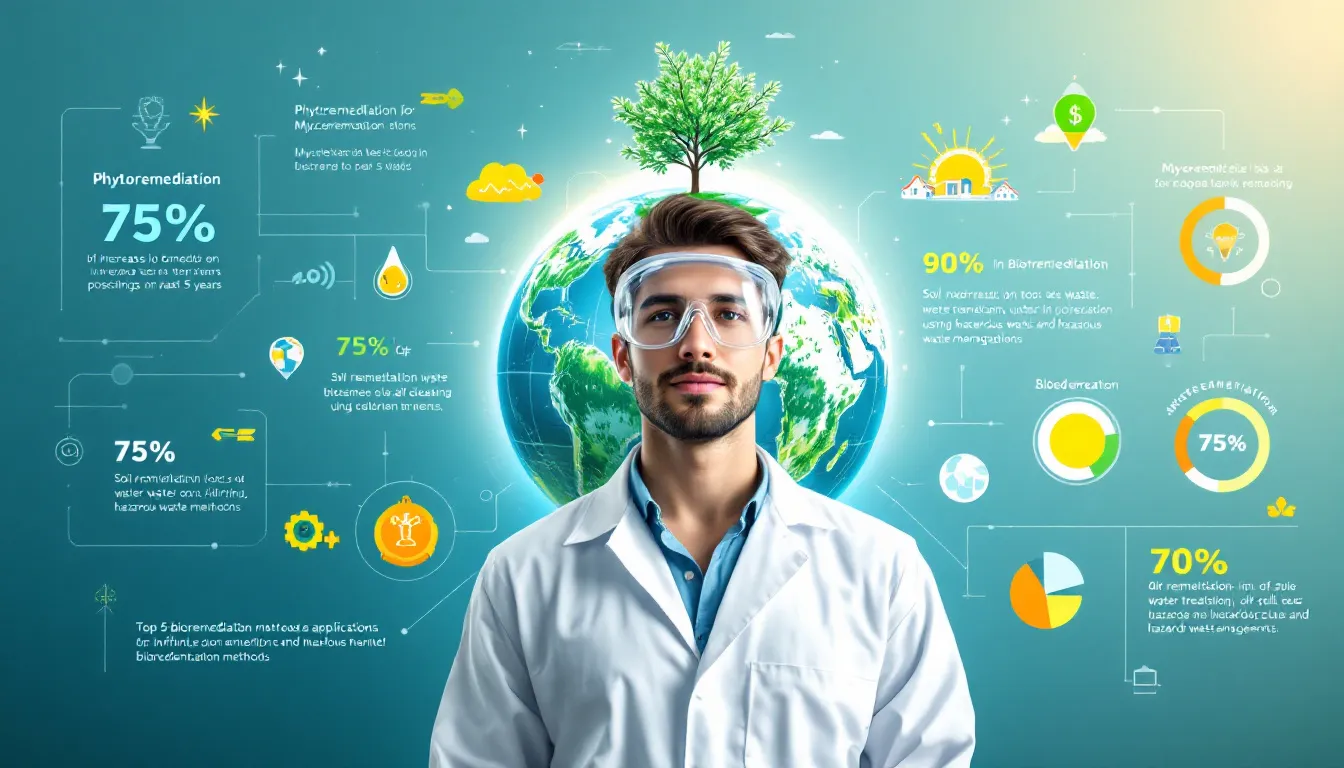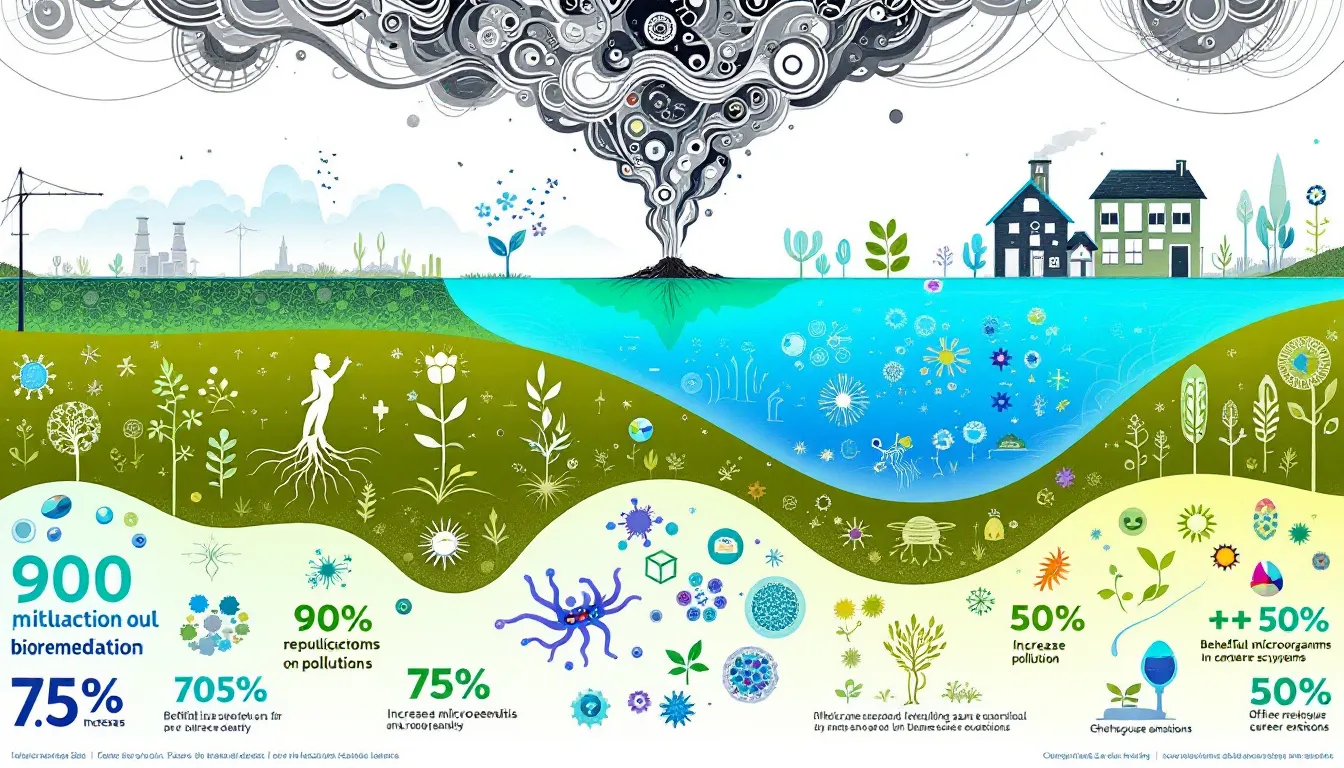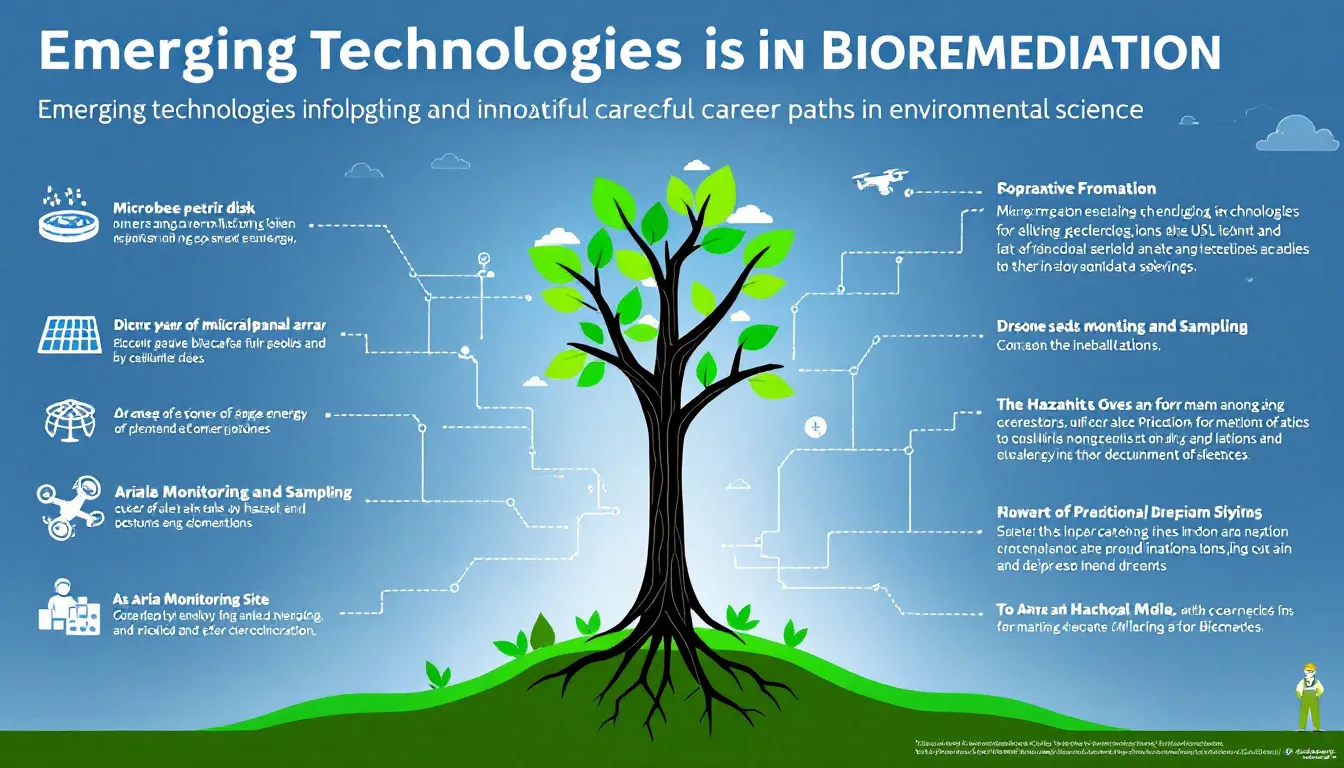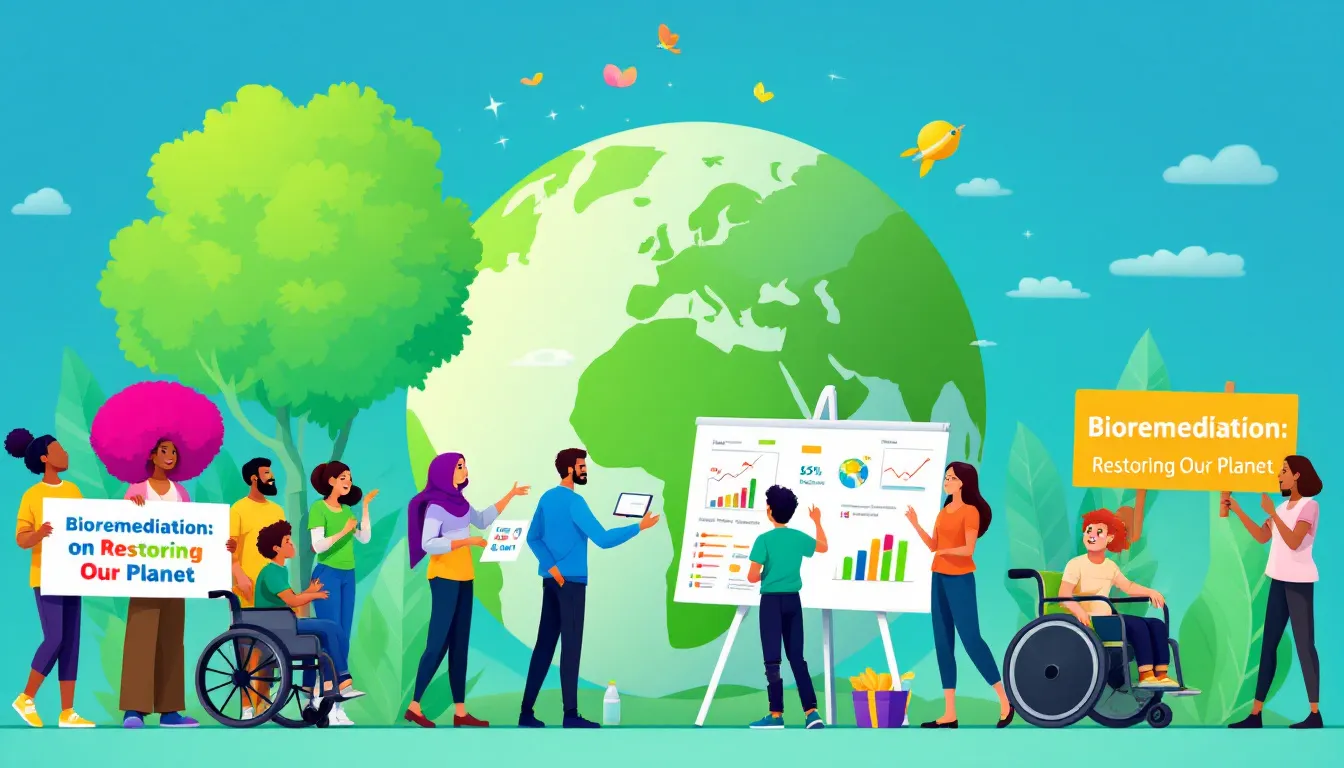Jobs in Bioremediation Career Opportunities

Top Jobs in Bioremediation: Career Opportunities and Growth Prospects
Looking for rewarding jobs in bioremediation? This field is dedicated to using biological methods to clean polluted environments. Careers in bioremediation span from scientific research to hands-on fieldwork, each playing a crucial role in environmental restoration. This article will guide you through various career paths, necessary qualifications, and growth opportunities in this impactful field.
Key Takeaways
Bioremediation careers encompass a variety of roles, from scientific research to fieldwork, and offer opportunities for both degree holders and those without formal education through training programs.
The process of bioremediation leverages microorganisms to eliminate pollutants from various environments, utilizing techniques such as pump and treat and soil vapor extraction to restore contaminated sites.
Emerging technologies, including AI and nanotechnology, are enhancing the efficiency of bioremediation methods, making this field increasingly vital for environmental restoration and offering significant growth prospects.
Exploring Bioremediation Careers

Bioremediation specialists play a crucial role in employing biological methods to clean polluted environments, contributing significantly to environmental restoration and human health. The field of environmental remediation offers a broad spectrum of career opportunities, from scientific research to hands-on fieldwork. These roles are essential in reversing environmental damage and employing innovative technologies to tackle pollution.
The beauty of this field lies in its accessibility. While many positions require a college degree, there are numerous opportunities for individuals without formal education through various training programs. This inclusivity ensures that a diverse range of talents can contribute to the mission of environmental remediation, making it a field ripe with potential for those passionate about making a difference.
Understanding Bioremediation

Bioremediation leverages the power of microorganisms to remove pollutants from soil and water, enhancing natural processes to achieve environmental restoration. Microbes break down chemical pollutants, making them less harmful or even harmless. Techniques such as pump and treat, which purifies contaminated groundwater, and soil vapor extraction, particularly effective for petroleum products, are integral to this process.
The process can be applied to various media, including:
Soil
Sediment
Groundwater
Surface water
This makes it versatile and broadly applicable. Increasing oxygen content in contaminated areas allows naturally occurring bacteria and other microbes to thrive, which accelerates the remediation process. Chemical oxidants like hydrogen peroxide are also used to break down stubborn contaminants, ensuring thorough cleanup.
The ultimate goal of bioremediation is to purify and revitalize contaminated environments, making them safe for redevelopment and human use. Conducting studies and tests is crucial to determine the most suitable remediation methods for specific pollutants, ensuring effective and compliant cleanup processes. This scientific approach not only restores the environment but also protects human health by eliminating harmful pollutants.
Key Roles in Bioremediation Projects
Bioremediation projects are a collaborative effort involving a diverse array of professionals. Each role is vital to the success of these projects, including:
Environmental scientists
Engineers
Construction workers
Equipment operators
Here are some key roles and their responsibilities in bioremediation.
Environmental Scientists
Environmental scientists are at the forefront of bioremediation efforts, using their expertise to analyze pollution data and devise remediation strategies that comply with regulations. Their work often involves integrating knowledge from multiple scientific disciplines such as biology, chemistry, and environmental science to develop effective and sustainable solutions.
In cities like San Francisco, environmental scientists play a crucial role in addressing urban pollution and contributing to environmental restoration. They review and analyze data, considering various environmental factors to ensure that bioremediation processes are both effective and compliant with environmental laws. Their work transforms polluted sites into safe, usable land.
Biochemists and Microbiologists
Biochemists and microbiologists are the unsung heroes of bioremediation, working behind the scenes to identify and utilize specific microorganisms capable of breaking down pollutants. Their deep understanding of genetic information and chemical processes enables them to select the most effective microbial strains for different types of pollution.
These scientists collaborate closely with engineers and other scientists to implement bioremediation methods effectively. Their work involves a blend of laboratory research and field studies, ensuring that the chosen microorganisms perform optimally in real-world conditions.
The intricate interplay between science and practical application makes their role indispensable in the bioremediation process.
Engineers and Technicians
Engineers in bioremediation are responsible for developing technical solutions and designing systems to ensure effective pollution cleanup. They create innovative methods to minimize pollution and enhance cleanup efficiency, making them pivotal in the success of remediation projects. A bachelor’s degree in a specific engineering field is typically required for these roles, and many pursue a Professional Engineer (PE) certification to further their qualifications.
Environmental engineering technicians implement the plans created by engineers. They play a crucial role in executing those designs. They test and operate cleanup equipment, ensuring that the systems function as intended and that the remediation efforts are successful. Their hands-on skills and ability to adapt to new technologies are critical in executing bioremediation projects effectively.
Employers in this field value practical skills and innovative thinking. Engineers and technicians often work together, blending theoretical knowledge with practical application to tackle complex environmental challenges. Their combined efforts result in efficient and effective bioremediation processes that restore polluted environments.
Management and Business Roles
Management and business roles are essential in the bioremediation field, ensuring that projects are planned, organized, and executed effectively. These roles involve strategic planning, resource allocation, and supervision of cleanup workers, making them integral to the success of environmental remediation initiatives.
Here are some critical roles in more detail.
Project Managers
Project managers in bioremediation oversee:
The planning, execution, and completion of projects, ensuring they are completed on time and within budget.
Leading teams of scientists, engineers, and field workers.
Managing timelines and resource allocations to meet project goals.
Their ability to coordinate complex processes and manage a team is crucial in ensuring the success of bioremediation initiatives.
Project managers navigate the various challenges that arise during remediation projects. Their strategic vision and leadership skills enable them to guide their teams through complex processes, ensuring that all aspects of the project are aligned with environmental regulations and safety standards.
Compliance Officers
Compliance officers play a vital role in ensuring that bioremediation projects adhere to environmental laws and regulations. They enforce safety regulations and ensure that all remediation processes comply with legal standards. Typically holding a bachelor’s degree in business or a related field, compliance officers undergo moderate-term on-the-job training to fulfill their responsibilities effectively.
Their work is essential in maintenance the integrity and legality of bioremediation efforts.
Field Work and Equipment Operation
Field work and equipment operation are the backbone of bioremediation projects, involving physically demanding tasks and the use of specialized machinery. These roles are crucial in executing the practical aspects of environmental remediation, ensuring that contaminated materials are effectively removed and sites are restored.
Here are the specific roles involved, determined by the responsibility of the position in the project system.
Field Technicians
Field technicians are responsible for a range of tasks, including removing debris, loading and unloading materials, digging trenches, and operating machinery. They play a crucial role in identifying and disposing of hazardous materials, ensuring that remediation sites are safe and compliant with environmental regulations. Their hands-on skills and attention to detail are essential in conducting on-site assessments and implementing bioremediation methods.
These technicians often work in challenging environments, requiring them to be adaptable and skilled in using new technologies and equipment. Their support is invaluable to scientists and engineers, as they provide the practical implementation needed to bring bioremediation strategies to life.
Equipment Operators
Equipment operators in bioremediation handle specialized machinery such as pumps, excavators, and dredgers, which are vital for onsite remediation. They play a key role in excavation and dredging processes, removing contaminated materials from sites to facilitate further cleanup efforts. Their expertise in operating and maintaining this equipment ensures that remediation projects are carried out efficiently and safely.
Dredge operators, for example, excavate waterways by removing sand, gravel, or rock, significantly improving the health of contaminated aquatic environments. These operators require specialized training to handle complex machinery and adhere to strict safety protocols, ensuring the success and safety of remediation operations.
Training and Education Requirements
A career in bioremediation often requires specific educational and training qualifications. From bachelor’s degrees to on-the-job training, these requirements ensure that professionals are well-equipped to handle the complexities of environmental remediation.
Here are the key educational pathways and training programs.
Bachelor's Degree in Environmental Science or Related Field
Many roles in environmental remediation require a bachelor’s degree in environmental science or a related field for entry-level positions. This educational foundation provides the necessary knowledge in biology, chemistry, and environmental science needed to understand and address pollution issues effectively.
Entry-level positions for environmental scientists, for example, typically demand at least a bachelor’s degree in a natural science or engineering. This degree equips professionals with skills to analyze data, develop remediation strategies, and ensure compliance with environmental regulations, making it essential for a successful career in bioremediation.
On-the-Job Training
On-the-job training is a critical component of career development in bioremediation. This training provides practical skills and knowledge necessary for effective remediation efforts. Depending on the complexity of the tasks, on-the-job training can last from a few weeks to several months. Workers handling hazardous materials undergo specialized training to ensure safety and compliance during remediation processes.
Field technicians, for example, may be required to wear personal protective equipment to ensure their safety while working in potentially hazardous environments. This training ensures that workers are well-prepared to handle the physical and technical demands of bioremediation projects, contributing to the overall success and safety of the operations, characteristic protected.
Emerging Technologies in Bioremediation

The field of bioremediation is continuously evolving, with emerging technologies playing a crucial role in enhancing the efficiency and effectiveness of remediation strategies. Artificial intelligence (AI), for instance, is increasingly utilized to optimize bioremediation processes, particularly for handling river pollution. AI-driven optimization allows for real-time monitoring and adaptive control, improving pollutant degradation efficiency.
Nanotechnology is another promising area, utilizing engineered nanoparticles to improve pollutant absorption and microbial activity. Advanced oxidation processes (AOPs), which leverage chemical reactions with hydroxyl radicals, are effective in eliminating resistant contaminants. Technology is playing a crucial role in these advancements.
These technologies, combined with genome-scale modeling and AI, facilitate the design of high-performance microbial systems tailored for efficient pollutant breakdown. The integration of these new technologies ensures that bioremediation remains at the forefront of environmental restoration.
Equal Opportunity in Bioremediation Careers

Diversity and inclusion are vital in the bioremediation field, bringing a range of perspectives and ideas that enrich the discipline and foster innovation. Organizations are increasingly implementing policies to support diversity and reinforce inclusion within their hiring processes, ensuring that all individuals, regardless of race, national origin, gender identity, or sexual orientation, have access to career opportunities in bioremediation.
Research shows that diverse teams in environmental science and bioremediation yield better outcomes, as varied perspectives lead to more comprehensive solutions. An inclusive environment cultivates collaboration, which is essential for tackling complex environmental issues encountered in bioremediation projects.
This commitment to equal opportunity employment not only aligns with social equity goals but also enhances problem-solving and adaptability in bioremediation efforts.
Benefits and Growth Prospects

The growing emphasis on sustainability has led to a surge in demand for professionals skilled in bioremediation. This field offers not only financial incentives but also the opportunity to contribute positively to environmental health and restoration. As part of the expanding green economy, careers in environmental remediation provide job stability and security, as polluted sites continue to be discovered and require cleanup.
Many remediation occupations offer significant advancement opportunities due to the diverse range of skills required and the interdisciplinary nature of the work. Workers in this field are often employed by various organizations, including government agencies, which can provide additional job security.
The combination of job stability, potential for career growth, and the intrinsic reward of contributing to environmental sustainability makes bioremediation a highly attractive career path.
Summary
In summary, bioremediation offers a wide range of career opportunities for those passionate about environmental science and restoration. From scientific research and fieldwork to management and business roles, each position plays a crucial part in reversing environmental damage and promoting sustainability. With the integration of emerging technologies and a commitment to diversity and inclusion, the bioremediation field is poised for significant growth and innovation. Embrace the potential to make a meaningful impact on our planet by exploring a career in bioremediation today.
Frequently Asked Questions
What educational background is required for a career in bioremediation?
A bachelor's degree in environmental science or a related field is typically required for entry-level positions in bioremediation, while advanced roles may necessitate specialized degrees or certifications in natural sciences or engineering.
What are some of the emerging technologies in bioremediation?
Emerging technologies in bioremediation prominently feature artificial intelligence to optimize processes, nanotechnology for enhanced pollutant absorption, and advanced oxidation processes to effectively eliminate resistant contaminants. These innovations are paving the way for more efficient environmental cleanup methods.
Are there opportunities for individuals without a college degree in bioremediation?
Yes, individuals without a college degree can find opportunities in bioremediation through training programs, especially in roles such as field technicians and equipment operators. These positions often provide on-the-job training that equips individuals with the necessary skills.
How does diversity impact the bioremediation field?
Diversity significantly enhances problem-solving and adaptability in bioremediation projects, leading to improved outcomes. Inclusive teams foster collaboration, which is crucial for addressing complex environmental challenges effectively.
What are the growth prospects in the bioremediation field?
The bioremediation field presents substantial growth opportunities driven by the rising focus on sustainability and the expanding green economy. This growth is likely to translate into stable careers, financial benefits, and prospects for advancement.



